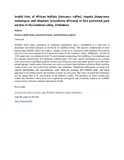Please use this identifier to cite or link to this item:
https://cris.library.msu.ac.zw//handle/11408/3078Full metadata record
| DC Field | Value | Language |
|---|---|---|
| dc.contributor.author | Moyo, Doreen Zandile | |
| dc.contributor.author | Chakuya, Jeremiah | |
| dc.contributor.author | Sungirai, Marvelous | |
| dc.date.accessioned | 2018-08-08T09:44:22Z | |
| dc.date.available | 2018-08-08T09:44:22Z | |
| dc.date.issued | 2018-02-06 | |
| dc.identifier.uri | http://hdl.handle.net/11408/3078 | |
| dc.identifier.uri | https://rdcu.be/4bGZ | |
| dc.description.abstract | Wildlife hosts many pathogens of economic importance and is considered as a reservoir of important tick-borne diseases of livestock in southern Africa. The species composition of ticks parasitizing buffalo (Syncerus caffer), impala (Aepyceros melampus) and elephant (Loxodonta africana) was investigated in five protected parks in the Zambezi valley, Zim-babwe. A total of 1104 adult ticks was collected from 75 adult animals comprising five buffaloes, five elephants and five impalas drawn from five protected wildlife parks. Five tick species belonging to two genera were recovered, with Rhipicephalus decoloratus being the most prevalent species in all the three animal groups. Amblyomma hebraeum was only recovered from buffaloes whereas Rhipicephalus zambeziensis was recovered from buffa-los and elephants. Significant differences in mean tick species distribution and concentra-tion were observed amongst the wildlife parks and these appeared to be influenced by the number of hosts in each park. The study revealed that buffaloes are the major host of R. decoloratus in the Zambezi valley. The presence of these ixodid ticks within the Zambezi valley may have significant ecological and economic impacts on wildlife conservation, domestic animals and human health. | en_US |
| dc.publisher | Springer Nature | en_US |
| dc.source.uri | https://rdcu.be/4bGZ | |
| dc.subject | Ixodid ticks Rhipicephalus spp. Wildlife Zambezi valley· Zimbabwe | en_US |
| dc.title | Ixodid ticks of African buffalo (Syncerus caffer), impala (Aepyceros melampus) and elephant (Loxodonta africana) in five protected park estates in the Zambezi valley, Zimbabwe | en_US |
| dc.type | Article | en_US |
| item.cerifentitytype | Publications | - |
| item.openairetype | Article | - |
| item.fulltext | With Fulltext | - |
| item.grantfulltext | open | - |
| item.openairecristype | http://purl.org/coar/resource_type/c_18cf | - |
| Appears in Collections: | Research Papers | |
Files in This Item:
| File | Description | Size | Format | |
|---|---|---|---|---|
| Ixodid ticks of African buffalo.pdf | Abstract | 190.17 kB | Adobe PDF |  View/Open |
Page view(s)
186
checked on Jan 20, 2026
Download(s)
34
checked on Jan 20, 2026
Google ScholarTM
Check
Items in MSUIR are protected by copyright, with all rights reserved, unless otherwise indicated.



